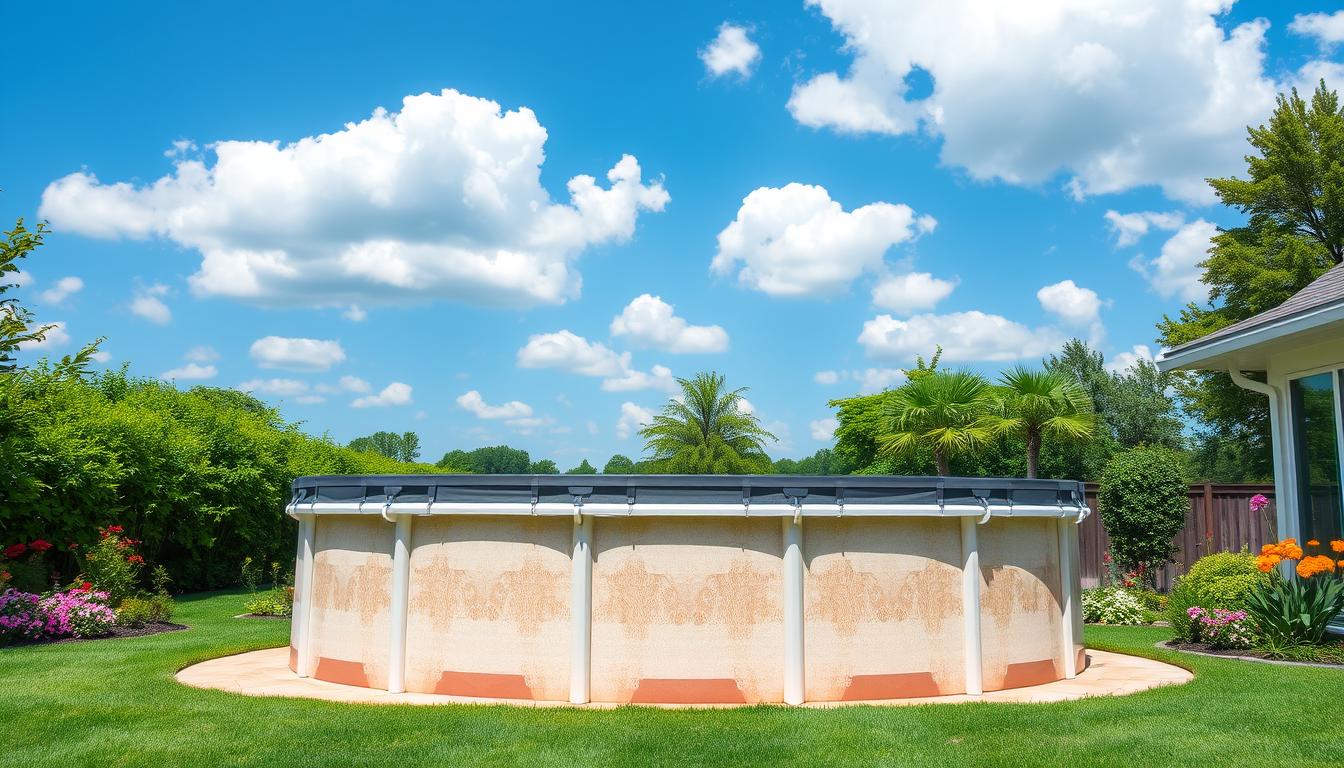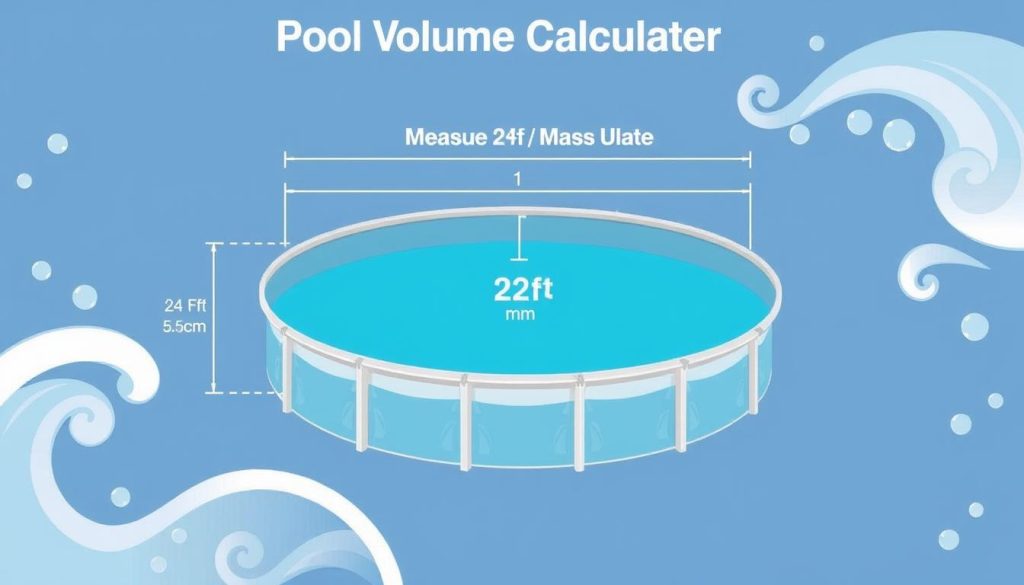
Many dream of a backyard pool for summer fun. A 24-foot above ground pool is a popular choice.
Knowing water requirements helps with initial costs and maintenance. It’s vital for water quality and safe swimming. Pool volume affects various aspects of ownership.
This spacious pool is easy to install. We’ll explore factors that influence pool capacity. We’ll also discuss the importance of accurate calculations.
This knowledge will help you become a more informed pool owner. You’ll be better equipped to care for your pool properly.
Understanding Pool Volume: Why Gallon Count Matters
Knowing your above ground pool’s gallon count is crucial. It affects chemical treatments, water quality, heating, and filtration. Understanding these factors helps optimize your backyard pool design for a safe, enjoyable swim.
Impact on Chemical Treatments and Water Quality
Pool volume determines the right amount of chemicals for balanced, sanitized water. Incorrect estimates can lead to improper dosages. This may cause skin irritation, cloudy water, or equipment damage.
Proper water chemistry is vital for a healthy pool. Regular testing and adjusting chemical levels are key to maintaining water quality.
Regular use of shock treatments is essential in pool maintenance. Pool shock involves adding high concentrations of chlorine to rapidly increase free chlorine levels.
Follow these pool maintenance tips for optimal water quality:
- Test your pool water regularly and adjust chemical levels as needed
- Shock your pool weekly for high use and bi-weekly for less frequent use
- Maintain chlorine levels between 1-3 ppm in outdoor pools
- Keep the pH level between 7.2 and 7.6 for maximum chlorine effectiveness
Optimizing Heating Efficiency and Energy Costs
Knowing your 24 foot above ground pool’s volume helps estimate heating costs. This allows you to choose the right heater size. You can also develop strategies to reduce energy use.
Ensuring Proper Filtration and Circulation
Effective filtration and circulation keep water clear and prevent algae growth. Your pool’s pump and filter size should match its gallon count. This ensures proper cleaning and circulation of all water.
Consider these factors when choosing pool accessories like pumps and filters:
- Choose a pump with a flow rate suitable for your pool’s volume
- Opt for a filter with the appropriate square footage for your pool size
- Ensure the pump and filter are compatible with your pool’s plumbing
| Pool Size | Water Capacity (Gallons) | Ideal Number of People |
|---|---|---|
| 14ft Oasis Pool | 4,400 | 6-7 |
| 16ft Oasis Pool | 5,246 | 8 |
| 18ft Oasis Pool | 6,600 | 8-9 |
Understanding your pool’s gallon count helps with chemical treatments, heating, and filtration. This knowledge creates a safe, comfortable swimming environment for everyone to enjoy.
Calculating the Gallons in a 24 Foot Above Ground Pool
Knowing your pool’s gallon capacity is crucial for proper maintenance. A pool volume calculator offers the most accurate measurement. Let’s explore how to calculate the volume of a 24-foot above-ground pool.
Formula for Determining Volume in Round Pools
For circular pools, use this formula to calculate water volume:
Volume = π x radius² x depth x 7.48
Here, π is 3.14, radius is half the pool diameter, and depth is the average pool depth in feet. The constant 7.48 converts cubic feet to gallons.

Practical Example: 24 Foot Round Pool with 52″ and 54″ Wall Heights
Let’s apply the formula to a real-world scenario. For a 24-foot round pool with a 52-inch wall height:
- 24 feet diameter ÷ 2 = 12 feet radius
- 52 inches ÷ 12 = 4.33 feet average depth
Plugging these values into the formula, we get:
Volume = 3.14 x 12² x 4.33 x 7.48 = 14,651.7 gallons (rounded to 14,652)
For a 24-foot round pool with a 54-inch wall height:
Volume = 3.14 x 12² x 4.5 x 7.48 = 15,226.6 gallons (rounded to 15,227)
| Pool Size | Wall Height | Gallons |
|---|---|---|
| 24 ft Round | 52″ | 14,652 |
| 24 ft Round | 54″ | 15,227 |
If your pool size differs, use the appropriate formula based on its shape. This information helps maintain proper chemical balance and filtration in your pool.
Gallon Capacity Comparison: 24 Foot vs. Other Above Ground Pool Sizes
Pool sizes vary widely in water capacity. Round pools range from 15 to 33 feet across. Oval pools span 11×25 to 21×43 feet. Wall heights are usually 48, 52, or 54 inches.
A 15-foot round pool with 52-inch walls holds about 5,300 gallons. An 18-foot round pool with the same height contains 7,600 gallons. Our 24-foot pool with 52-inch walls holds 14,652 gallons.
Oval pools have different capacities based on size. An 18×33 oval pool with 52-inch walls holds 14,000 gallons. Our 24-foot round pool with 54-inch walls holds 15,227 gallons.
These differences affect chemical treatments, heating, and filtration. In-ground pools also vary in size and capacity. A 16×32 rectangular pool holds about 19,200 gallons. A 20×40 kidney-shaped pool contains around 20,200 gallons.
Choose your pool size based on space, use, and number of swimmers. Compare gallon capacities to make the best choice. This ensures a great swimming experience for years.







